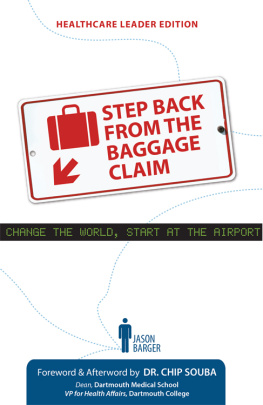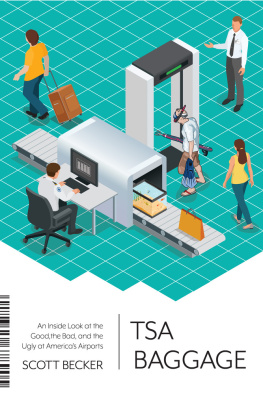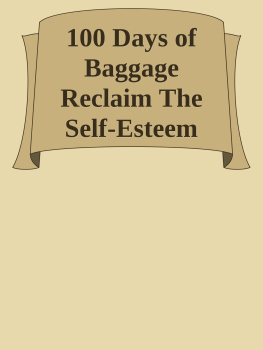
HEALTHCARE LEADER EDITION

Change the World, Start at the Airport
by Jason V. Barger
Foreword & Afterword by Dr. Wiley Chip Souba
One Love Publishers
Step Back from the Baggage Claim
Change the World, Start at the Airport
HEALTHCARE LEADER EDITION
Copyright 2008, 2010 - revised Healthcare Leader Edition
by Jason V. Barger
All Rights Reserved. No part of this book may be used or reproduced in any
manner whatsoever without written permission except in the case of brief
quotations and references.
This book may be purchased for personal, educational, business, or sales
promotional use. To obtain discounted bulk copies for your organization,
please contact . For information
please visit www.stepbackfromthebaggageclaim.com
Healthcare Leader Edition - First Edition
ISBN: 978-0-615-41311-2
One Love Publishers
PRINTED IN THE UNITED STATES OF AMERICA
Cover Design: Adam Emery
This book is dedicated to the countless people who fight every day to mitigate illness and suffering. Our commitment is to create a future for healthcare that touches, moves, and inspires all of us. Thank you to the countless individuals and organizations who have joined the Step Back from the Baggage Claim Movement.
Celebrating
Step Back from the Baggage Claim
Jason, and this book, aspire to make a difference - and are doing so as more and more people put this spirit into action in their organizations. He offers valuable reminders and simple principles that can guide the leadership actions you take in your own life and business.
- Howard Behar, former President, Starbucks International
In the same way Mark Twain considered himself a prodigious noticer, Jason Barger takes the obvious things that surround us when we travel through airports and uses them to illustrate profound life truths. Step Back from the Baggage Claim is a delightful little book that will cause you to think thoughts you probably should have been thinking already! Jason does a great job showing us how to travel through life gracefully.
- Chris Brady, New York Times Best-Selling Co-Author,
Launching a Leadership Revolution
To Step Back from the Baggage Claim means to exit the rat race, if only for a moment. This disciplined practice creates the space, a kind of opening that allows us to observe our blind spots, home to our hidden assumptions and taken for granted presuppositions. In the act of stepping back, we make room for new ways of being and thinking, allowing our best selves and our best leadership to emerge.
- Dr. Wiley Chip Souba, Dean, Dartmouth Medical School
The Step Back from the Baggage Claim Movement
has been highlighted by:
* The New York Times * International Herald Tribune
* Kiplinger * National Geographic Traveler * Book TV
* ABC News * Seattle Times * and many more
Learn more at
www.StepBackFromTheBaggageClaim
CONTENTS
Spread Your Book Around the World
There is an agonizing cry today for a different kind of world. Most of us sense it as a disquieting cry from afar when it is really a call from deep within. It is an appeal for help, a plea for healing. It is a leadership call because it summons each of us to join hands, to move the world forward, and to improve the human condition. While this call may get our attention momentarily - perhaps through a touching television documentary on children with cancer or a poignant commentary in the newspaper about the 45 million uninsured Americans - our fleeting concern is overcome by other more pressing priorities: hitting that deadline at work, inking that deal, catching that plane, making that tee time. We shake our heads and tell each other that our world, a world rampant with healthcare disparities, chronic diseases, and runaway costs is in a sad state of affairs. But we do not heed the call.
Nowhere is this need for leadership greater than in health care. Ask just about anybody where change is needed and theyll readily recite their top 10 causes of our broken health care system. Culprits are likely to include: Doctors who make too much money; waiting 7 hours in the emergency room; waiting for 5 months to get an appointment; bills impossible to figure out; the list, which invariably has been personalized, goes on. Theyll offer solutions too: Get some people in the White House who know the difference between their ass and third base, or Run healthcare like you would any other business or The uninsured should pull themselves up by their bootstraps like I did. Curiously, the numerous proposed solutions to our healthcare predicament - fix this, fix that, change this, change that - seem to exclude a fundamental imperative: I need to change too.
Deep down we care because we are human. Our capacity for compassionate action far exceeds that of any other species. But the leadership challenges in healthcare we are called to confront are huge, overwhelming, and sometimes imponderable. So we tell ourselves that we are not responsible or that theres nothing much we can do about them. In fact, we often dont know what to do about them. We let ourselves off the hook by saying that they have been around forever. Its easy to rationalize things away by saying, Its not my problem. Its easy to attribute the unworkability of healthcare to just the way it is. Indeed, we would have to radically change who we are and how we see the world in order to imagine ourselves playing a central role in taking responsibility for tackling these painful, complex challenges.
When I first met Jason Barger, it was clear, within minutes, that he was up to something important in life. He had taken heed of the call, reminding me of what Gandhi said, You must be the change you wish to see in the world. There was a palpable sense of a man with a purpose, someone who was willing to lose sight of the shoreline in order to explore new possibilities, yet never lose sight of his goal of making a difference in the world.
John Lennon once said that life is what happens to you while youre busy making other plans. Like many of you, I was all caught up - busy running the rat race, trying to be the first to step over the finish line. Jason invited me to step back. Life has a way, if youre willing to step back and listen, of helping us find our bearings so we can get back on the right track. At some point, we each need to step back so we can illuminate our blind spots, revise our mental models, and move forward, together. But we have to step back first. As Albert Einstein famously suggested, Without changing our patterns of thought, we will not be able to solve the problems we created with our current patterns of thought.
Most of us come to the table with a fixed and predetermined set of assumptions about how a particular societal leadership challenge should be solved. We are usually not aware of these assumptions but they are bolted firmly to our DNA. It is exceedingly difficult to pry us loose from these deeply entrenched beliefs. But we must be willing to let go of the ones that are holding us back. Why? Because our automatic, default way of being, which says, Im right, I know how to fix the problem or Im not responsible for the problem, you deal with it, doesnt work in solving the really taxing challenges we must face. The surgeon who believes that the patient will only have an optimal outcome if he calls all the shots, almost certainly needs to learn to play more effectively on the team. The member of housekeeping who assumes that his job has nothing to do with the mission of the hospital must come to appreciate the essential role of cleanliness in providing high quality patient care. The husband who thinks his marriage will improve only if his wife changes, in all likelihood needs to change himself. In general, there are three sides to any discussion, debate or argument: your side, the other guys side, and the right side. In learning to listen to all sides, we learn to exercise real leadership.













